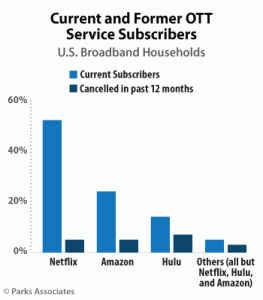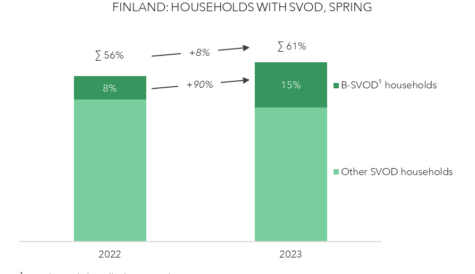
After more than 40 years of operation, DTVE is closing its doors and our website will no longer be updated daily. Thank you for all of your support.
Top three dominate as US OTT churn edges upwards
 About 20% of US broadband homes had cancelled at least one OTT service in the last 12 months at the end of 2015, according to data from Parks Associates. Netflix has the lowest churn among US OTT services, with 5% of broadband households cancelling the service over the 12 months.
About 20% of US broadband homes had cancelled at least one OTT service in the last 12 months at the end of 2015, according to data from Parks Associates. Netflix has the lowest churn among US OTT services, with 5% of broadband households cancelling the service over the 12 months.
According to Parks Associates, the overall estimated OTT churn figure had edged up to one in five homes at the end of the year from 18% at the end of the second quarter. Netflix’s estimated churn rate also edged up, from 4% to 5% of broadband households. The 12-month churn rate included those who cancelled at the end of their free trial period.
Netflix remains the most popular US OTT service, with 52% of broadband households taking the service at the end of 2015. Amazon was taken by 24% of broadband homes, with a higher, but declining churn rate.
Hulu was taken by 14% of broadband homes and experienced a much higher churn rate, with 7% of broadband homes cancelling the service over the 12 months to the end of 2015.
Only about 5% of US broadband households took one or more of the remaining 98 OTT services counted by Parks Associates, including CBS All Access, Sling TV, HBO Now, and Crunchyroll. Three per cent of broadband homes cancelled a subscription to an OTT service other than Netflix, Amazon or Hulu.
According to Parks Associates’ OTT Video Market Tracker, 33 new OTT services entered the market over the year, with 64% of broadband households taking at least one service, up from 59% for the previous year.
“Several factors contribute to OTT video service churn by consumers. In some instances, consumers are experimenting with new services, trying a service and cancelling before the trial period ends or within a few months. Popular shows or events, such as HBO’s Game of Thrones or WWE Network’s Wrestlemania, can be beneficial in terms of attracting users. However, there is a risk that consumers will unsubscribe once they’ve watched these popular items. Ongoing perceived value, in the long run, is the biggest driver to churn. Services have to continue to provide users with validation of value and a reason to return. Otherwise, consumers will discontinue services to save money or because they feel that the subscription is not worth the cost,” said Brett Sappington, senior director of research, Parks Associates.
“On a service by service basis, the smaller OTT video services have relatively high churn, particularly relative to Netflix and Amazon. Reasons for cancellation vary by service, but there are some common trends. Cancellers of OTT services with linear features – such as Sling TV, CBS All Access, and PlayStation Vue – are more likely to subscribe with the intent to terminate the subscription after watching specific content. They are also more likely to be critical of a service’s interface than those who cancel VOD-only OTT video services,” Sappinton said.


